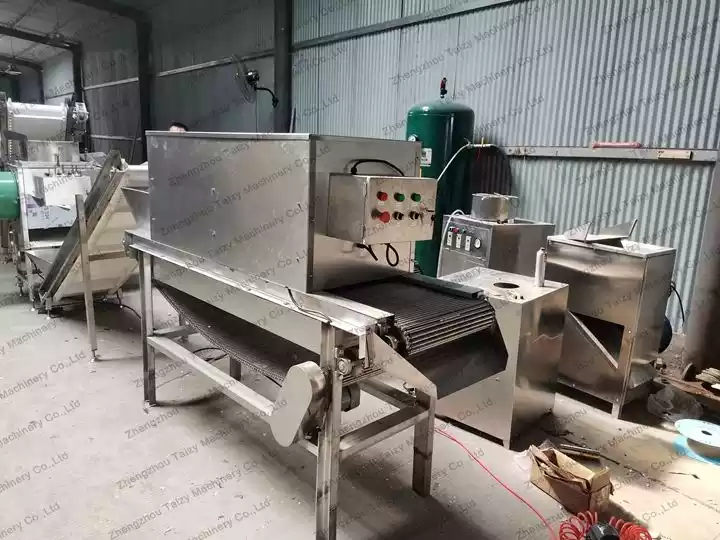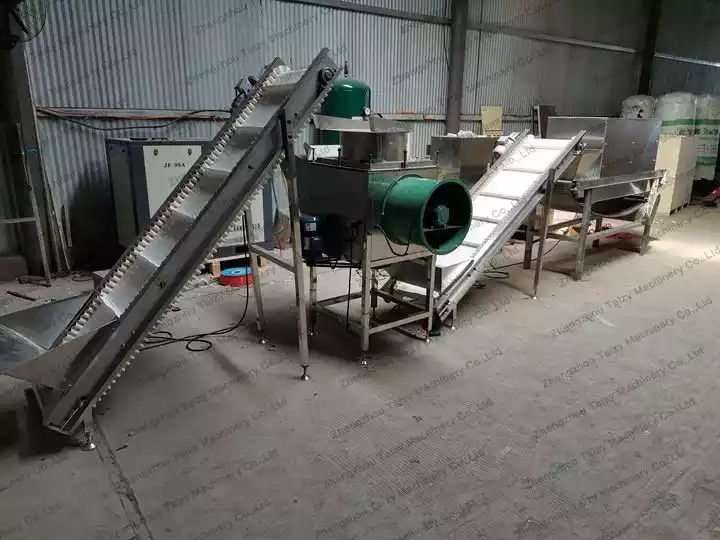Các đơn vị chế biến tỏi đóng vai trò quan trọng trong ngành thực phẩm, cho phép chế biến tỏi hiệu quả và chuẩn hóa cho nhiều ứng dụng khác nhau. Nếu bạn đang xem xét việc đầu tư vào một đơn vị chế biến tỏi, một trong những yếu tố cần xem xét là chi phí. Trong bài viết này, chúng tôi sẽ khám phá các thành phần khác nhau góp phần vào chi phí của một đơn vị chế biến tỏi, giúp bạn đưa ra quyết định thông minh.
Ứng dụng của các đơn vị chế biến tỏi
- Công nghiệp chế biến thực phẩm: Tỏi là một trong những loại gia vị được sử dụng phổ biến để làm các loại thực phẩm và gia vị khác nhau như nước chấm, nước xốt, nguyên liệu xào,… Các nhà máy chế biến thực phẩm và cơ sở sản xuất thực phẩm cần các đơn vị chế biến tỏi để chế biến tỏi hiệu quả, nâng cao hiệu quả sản xuất và sản phẩm chất lượng.
- Ngành dịch vụ ăn uống: Tỏi là nguyên liệu quan trọng trong nhiều món ăn, các cơ sở phục vụ ăn uống như nhà hàng, khách sạn, nhà hàng thức ăn nhanh cần có dây chuyền chế biến tỏi để chế biến số lượng lớn tỏi như bóc vỏ, thái lát, xay nhuyễn để đáp ứng nhu cầu chế biến các món ăn.
- Ngành sản xuất gia vị: Tỏi được sử dụng rộng rãi để làm đồ gia vị như bột tỏi, tỏi hạt, dầu tỏi, v.v. Các doanh nghiệp sản xuất gia vị cần dây chuyền chế biến tỏi để thực hiện các bước quy trình như nghiền, xay và đóng gói tỏi.
- Ngành dược phẩm: Tỏi có giá trị dược liệu phong phú và được sử dụng rộng rãi trong sản xuất thuốc thảo dược cổ truyền và sản xuất các sản phẩm y tế. Các doanh nghiệp dược phẩm cần các đơn vị chế biến tỏi chế biến tỏi thành dạng bột thảo dược và chiết xuất thảo dược để sản xuất các sản phẩm và thuốc chăm sóc sức khỏe khác nhau.
- Ngành xuất khẩu ngoại thương: Nhiều nước có nhu cầu về tỏi rất lớn nên dây chuyền chế biến tỏi cũng có nhu cầu rất lớn trong ngành xuất khẩu ngoại thương. Nhà máy chế biến tỏi có thể nâng cao hiệu quả chế biến và chất lượng tỏi, đáp ứng nhu cầu sản phẩm tỏi của thị trường nước ngoài.

Các yếu tố ảnh hưởng đến giá thành đơn vị chế biến tỏi
- Chi phí thiết bị: Thành phần chính của chi phí là thiết bị chế biến tỏi. Chi phí có thể thay đổi tùy theo thiết bị cụ thể cần thiết cho nhu cầu xử lý của bạn. Các thiết bị phổ biến bao gồm máy bóc vỏ tỏi, máy phân loại và phân loại tỏi, máy cắt hoặc cắt tỏi và máy sấy tỏi. Mỗi thiết bị đều có mức giá riêng dựa trên các yếu tố như công suất, mức độ tự động hóa và chất lượng.
- Năng lực sản xuất: Năng lực sản xuất của đơn vị chế biến tỏi ảnh hưởng đáng kể đến giá thành. Các thiết bị có công suất cao hơn thường có giá cao hơn do khả năng xử lý khối lượng tỏi lớn hơn. Chi phí sẽ tùy thuộc vào năng lực sản xuất mong muốn để đáp ứng yêu cầu kinh doanh của bạn một cách hiệu quả.
- Tự động hóa và Công nghệ: Mức độ tự động hóa và tiến bộ công nghệ được tích hợp trong đơn vị chế biến tỏi có thể ảnh hưởng đến giá thành của nó. Các máy móc tiên tiến và tự động hơn có xu hướng đắt hơn nhưng mang lại hiệu quả, độ chính xác và năng suất cao hơn. Những tính năng này có thể hợp lý hóa quy trình xử lý và giảm chi phí lao động theo thời gian.
- Chất lượng vật liệu: Chất lượng vật liệu được sử dụng để xây dựng bộ phận chế biến tỏi ảnh hưởng đến độ bền, hiệu suất và giá thành của nó. Các thiết bị được làm từ vật liệu chất lượng cao, chẳng hạn như thép không gỉ, bền hơn và có khả năng chống ăn mòn. Mặc dù ban đầu chúng có thể đắt hơn nhưng chúng mang lại độ tin cậy lâu dài và giảm chi phí bảo trì.
- Các tính năng bổ sung và tùy chỉnh: Các tính năng bổ sung và tùy chọn tùy chỉnh có thể làm tăng thêm chi phí chung của đơn vị chế biến tỏi. Chúng có thể bao gồm các tiêu chí phân loại cụ thể, cài đặt có thể điều chỉnh, hệ thống băng tải và bảng điều khiển phù hợp với nhu cầu xử lý cụ thể của bạn. Việc tùy chỉnh có thể nâng cao hiệu quả và tính linh hoạt của thiết bị nhưng có thể phải trả thêm chi phí.
- Nhà cung cấp và Địa điểm: Nhà cung cấp bạn chọn và địa điểm của đơn vị chế biến tỏi cũng có thể ảnh hưởng đến chi phí. Các nhà cung cấp khác nhau có thể đưa ra các mức giá khác nhau dựa trên danh tiếng, giá trị thương hiệu, dịch vụ hậu mãi và điều khoản bảo hành của họ. Ngoài ra, các yếu tố như chi phí vận chuyển, thuế nhập khẩu và tỷ giá hối đoái có thể ảnh hưởng đến chi phí cuối cùng, đặc biệt nếu bạn mua hàng từ nhà cung cấp quốc tế.

Bán cơ sở chế biến tỏi của nhà máy Taizy
Giá thành của một đơn vị chế biến tỏi có thể khác nhau tùy thuộc vào các yếu tố như lựa chọn thiết bị, năng lực sản xuất, mức độ tự động hóa, chất lượng nguyên liệu, tính năng bổ sung, nhà cung cấp và địa điểm.
Điều cần thiết là phải đánh giá các yêu cầu chế biến, ngân sách và mục tiêu kinh doanh dài hạn của bạn khi xác định đơn vị chế biến tỏi phù hợp với bạn.
Tư vấn với các nhà cung cấp uy tín, so sánh giá cả và xem xét lợi tức đầu tư sẽ giúp bạn đưa ra quyết định sáng suốt và thiết lập một hoạt động chế biến tỏi hiệu quả và tiết kiệm chi phí.
